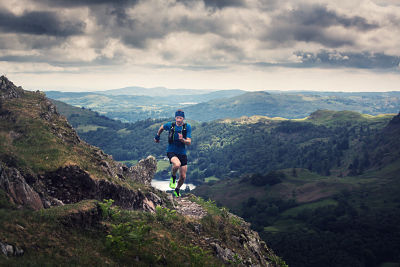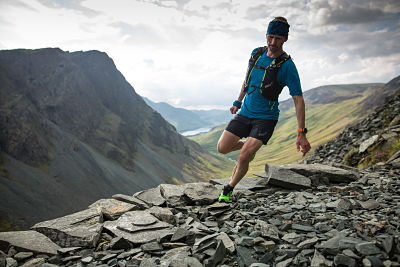I DNF'd (Did Not Finish) at the 105-mile Ultra-Trail du Mont-Blanc (UTMB), the de facto world championships of trail-ultramarathon running. After nine years in the sport and around 50 ultra-distance races and challenges, it was the first time I'd quit.
I’ve completed UTMB four times, the 260-mile Spine Race twice, set records on the Paddy Buckley Round in winter (solo), the 185-mile Coast to Coast route and the 630-mile South West Coast Path (please indulge me while I say these things out loud to help rebuild my fragile self-confidence).
I’ve continued in races after being medically advised to stop, when my wee turned cola coloured, when only power sobs got me through, and after one race I couldn’t run for seven weeks afterwards due to tendon damage.
I was proud of my record and imagined only a broken leg or a plague of locusts would eventually stop me. So I'm still a bit surprised that at UTMB I simply did not want to go on. My body was fine, really (not perfect, but only what I’d expect after 50 miles in the Alps). But my mind was injured.
I’m trying to work out why I gave up so easily? Whether I regret it? How much it matters? And what it’s taught me?
Why did I DNF?
Training for UTMB had felt good. The only thing really missing was a trip to the Alps. Two visits really helped me in 2018, when I finished in 5th place. The race only goes up to 2,500 metres, but I feel that a little altitude training stimulates physiological gains anyway, hence why elite marathon runners train in Kenya. Among other things, our government’s ad hoc quarantine laws conspired against me.
Nevertheless, in Chamonix I felt well rested, well supported by my sponsors and cock-a-hoop about going round Mont Blanc for a fifth time. Even if there were 70 male runners with a higher International Trail Running Association ranking than me, I was very motivated by the idea of again placing in the top-10 of the world’s most competitive ultra.

Traditionally I’ve been a bit of a 'Steady Eddie' and while the tortoise approach to pacing has brought me relative success, it only gets you so far. I was there to take some risks, to push and see what was possible. If you don’t try, you’ll never know. But of course, that increases the chances of mishaps.
The first three hours of the race were reasonably punchy but I felt 'top banana'. At Les Contamines (32km), the only crewing point until Courmayer (81km), I was five minutes behind my ambitious schedule, partly based on my 2018 splits, and in 20th position. Perfect really. Except I had no crew at Contamines. This was my decision, albeit a last-minute one, based on some complicated factors.
I’d not been crewed there before anyway, so didn’t see it as an issue. But I hadn’t been 'Full Vegan' at UTMB before either. I was carrying minimal calories, because I was keen to be light and, in my mind at least, therefore fast. I was nearly out of my own supplies, so I grabbed a banana and cola from the aid station.
Low mood, eat food
Over the 1,500m ascent to Bonhomme (2500m), my climbing slowed and the altitude seemed to hamper me. And/or was I under-fuelled? On the 1000m climb to Col Seigne (2500m), my climbing was weak and I realised I had no calories left. When I did reach minor aid stations I was focused on being super-efficient and didn't want to be weighed down by carrying excess calories. I was taking just enough to get me to the next one. At least, I thought I was.
I was getting passed, which was demotivating, and a blister was developing under my heel. My tummy was playing up on some descents, but a salt tablet fixed things. A 100-mile race will never be entirely smooth and I’ve had far worse. I remember thinking I’d get my heel taped up properly at Courmayer and sit down for a good feed too.
A while after midnight and eight hours into the race, my toe caught a rock and down I tumbled, bashing and cutting my knee. Again, I’ve had worse. But the fact a runner had tragically passed away from a fall in UTMB's sister race TDS a few days before did cross my mind (and puts this anguished, self-pitying blog massively in context). It just felt like everything was going wrong.
Despite getting some salty noodle soup down me at the next aid station, my mind seemed only capable of negative thoughts. Instead of being energised by runners overtaking me, as I might normally be, the act seemed to slow me further, escalating the occurrence.
I didn’t check my schedule, but figured (wrongly) I was way off it and probably about 40th place. I started considering whether there was any point in continuing on from Courmayer. I pondered it for more than an hour.
By the time I got there, I was in around 45th place (but only actually about 30 minutes behind my schedule). I was mentally done. I just, quite firmly, didn't want to go on. It just had no appeal.

The psychology of a DNF
Could I have continued? Absolutely. I’d done that four times.
Did I want to? Absolutely not. Partly because I’d done that four times.
I just wasn't motivated by the idea of bashing myself up for a further 13-16 hours for an outcome I wouldn’t be pleased with. It certainly wouldn’t teach me anything and I’d be a wreck for weeks afterwards.
I hated the feeling of letting others down, especially the inov-8 guys crewing for me. And it felt like stopping was somehow letting them down less, rather than forcing them to drive around the Alps for the rest of the night and next day. I even told myself they’d be secretly pleased.
For context, from 2,347 starters there were 826 DNFs at the 2021 UTMB, including most of the pre-race favourites, many of them at Courmayer, aka 'DNF Central'. And I can only think of two elite ultrarunners who haven't ever DNF'd during their careers (both female, incidentally).
I think my calorie deficit was the most significant factor. Precision Fuel & Hydration would later calculate I was only taking on 42g carbs per hour, when really I needed about 60-90g.
Sports Psychologist and The Ten Pillars of Success author Dr Josie Perry has since reminded me,
Food fuels our brain as much as it does our body.
And when our brain isn’t fuelled, we make decisions with the emotional part rather than the rational part.
The amygdala (or ‘the chimp’) tries to stop us from harming our self-identity. It wants to remove us from situations that threaten it.
"Normally our prefrontal cortex can drill back into our library of experiences and help us make more rational decisions. But it needs to be fuelled." So when my mind was under-fuelled, it allowed the chimp to take over, which bombarded me with negative messages, encouraging me to quit.
Low mood = eat food, is one of my race mantras. But I was so keen to be light and fast that often I had no food on me and didn't take enough from the aid stations.
The importance of 'performance' rather than 'outcome' goals
Goal setting was key, too. Other than tie Francois D’Heane’s shoelaces together at the start line (which may have been frowned upon), you can’t control what other runners will do.
So sports psychology encourages performance goals (time targets) rather than outcome goals (placings – a natural result of your performance).
I was aiming to run a sub 22-hour schedule, a little bit faster than 2018, which should consequently place me comfortably in the top-10. But as I sunk into that calorie deficit, I thought emotionally about my outcome goal, which looked to be slipping away. When really, rationally, I wasn't far off my performance goal. Finishing in under 23 hours would still have been an achievement for me (and likely mean top-20). I should've concentrated more on what I could control.
In business, there's talk of failing fast. Realising when something is a bad idea and backing out quickly before too much damage is done. Similarly, there’s a culture among elite ultra runners of dropping out of races, sometimes with less than compelling reasons – such as mine.
“I’ve DNF'd loads”, one of the best runners in the world told me the next morning. UTMB winner Courtney Dauwalter DNF'd her previous race, Hardrock 100, in July (though she may have had good reason). I used to look down my nose at that trend. Now I’ve become one of those elites. But are they being flaky or health-smart?
Was my DNF the right decision?
In terms of both long-term and immediate health, it was a wise decision. 100 miles in the mountains is not good for you, especially when racing. It normally takes me many weeks to fully recover, mentally as well as physically. Ultrarunning is a brutal sport, full of burnouts and I don't want to join those statistics. Instead now I feel ace and eager to race again.
Having no DNFs was part of my running identity (in my head at least), so I did mourn the loss of that a little. But I’ve made peace with it. It doesn’t change what I’ve achieved in the past and I think it will make me a better runner, coach and person.
In all honesty, while I wouldn't want it to become a habit (I did contemplate quitting halfway through this blog, but I've had a crumpet and feel like I will just about shuffle on to the finish...), it feels kind of liberating too. I don't have to 'guts it out' to the end, just for the sake of proving I can. I know I can do that as well as anyone. Doing it repeatedly could be pointless and damaging.
This is sport. There will inherently be losers and winners.
“Risk is the beauty of the sport”, added Josie. I didn't want to sit there in my rocking chair at 80 thinking I always finished but I never took any risks to see what was really possible. "Only those who will risk going too far can possibly find out how far one can go," said American poet T.S. Elliot.
But when I next take a risk in a race, I will think more about my performance goals, and eat a few more hummus and avocado sandwiches (or 'sangers' as I like to call them)...
